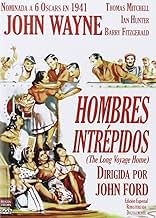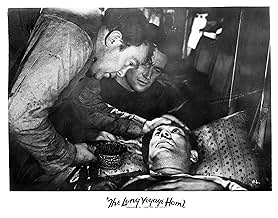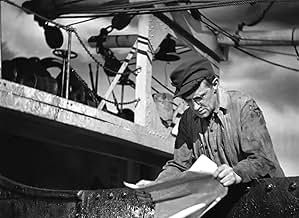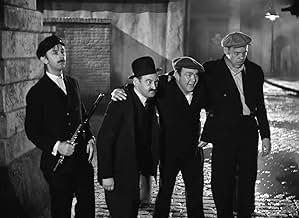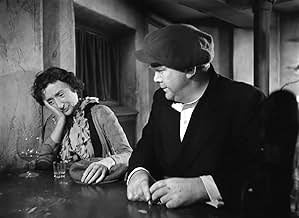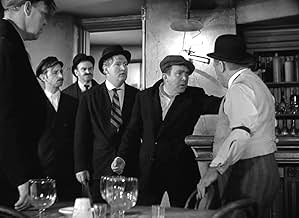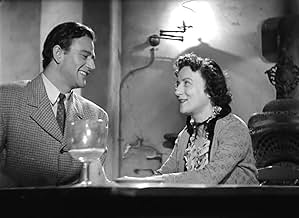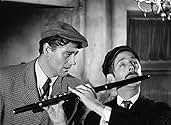AVALIAÇÃO DA IMDb
6,9/10
5,3 mil
SUA AVALIAÇÃO
Adicionar um enredo no seu idiomaA merchant ship's crew tries to survive the loneliness of the sea and the coming of war.A merchant ship's crew tries to survive the loneliness of the sea and the coming of war.A merchant ship's crew tries to survive the loneliness of the sea and the coming of war.
- Indicado a 6 Oscars
- 8 vitórias e 7 indicações no total
Wilfrid Lawson
- Captain
- (as Wilfred Lawson)
Joe Sawyer
- Davis
- (as Joseph Sawyer)
Constant Franke
- Norway
- (as Constant Frenke)
David Hillary Hughes
- Scotty
- (as David Hughes)
- Direção
- Roteiristas
- Elenco e equipe completos
- Produção, bilheteria e muito mais no IMDbPro
Avaliações em destaque
The talented cast acts this excellent screen rendition of Eugene O'Neill's play (it's adapted from three of his one-act plays) about crew sailors aboard a freighter steamer called ¨Glencairn¨ carrying charge containing war-smuggling , TNT , explosives from US to England , at the beginning WWII . This film's opening prologue states : "With their hates and desires men are changing the face of the earth - but they cannot change the Sea . Men who live on the Sea never change - for they live in a lonely world apart as they drift from one rusty tramp steamer to the next, forging the life of Nations" . The crew talk themselves and contend each other , but also save each other from bombing and risks . At the ending terminates with an epilogue that states : 'Some men like Ole and the Driscolls come a and go and the others live and die and the Yanks and Smittys leave their memories- but for the others the long voyage never ends' .
This dramatic film is a classic Ford , displaying his usual themes as strong issues in many films , such as emotionalism , partnership , friendship and unlovable camaraderie between the sailors . However , it seems to be sometimes excessively sentimental and looks over-melodramatic during the reading letters from Smittys . The sailors show a nostalgic longing for past things and old values and their own homes : Sweden , Ireland , England . Straightforward acting by John Wayne as a Swedish sailor named Ole , he was to star habitually for Ford after the director rose his career from B Western in ¨Poverty Row¨ productions , with his greatest hit , 'Stagecoach' . There's magnificent secondary cast playing the seamen , as Thomas Mitchell as a sympathetic sailor , Ian Hunter as the drunk and unbalanced Smittys , Mildred Natwick as a swindler prostitute , Rafaela Ottiano as a tropical woman , Jack Pennick , a Ford's usual , among others . Barry FitzGerald , who plays the character of humorous cook ¨Cocky¨ , and Arthur Shields, who played Donkeyman , were brothers in real life . They also appeared together in director John Ford's The quiet man (1952).
Descriptive , evocative black-and-white cinematography by Gregg Toland (Citizen Kane) , plenty of lights and shades , reflecting loneliness , dark suspicion , frightening from crew and the smoky , greasy , sweaty atmosphere from merchant ship . Cinematographer Gregg Toland's photographing of this movie utilized high contrast lighting . The picture belongs the best period when John Ford (1895-1973) made a rich variety of stories and his reputation rightly rests on his work in the 1940s , as ¨Grapes of wrath¨ , ¨How green was my valley¨ , ¨Fugitive¨ , ¨They were expendable¨ , ¨My darling Clementine¨ and the Cavalry trilogy : ¨Fort Apache¨ , ¨She wore a yellow ribbon¨ , ¨Rio Grande¨. Rating : Awesome , above average , a major triumph for Ford and Wayne . It's a must see from John Ford enthusiasts and John Wayne fans.
This dramatic film is a classic Ford , displaying his usual themes as strong issues in many films , such as emotionalism , partnership , friendship and unlovable camaraderie between the sailors . However , it seems to be sometimes excessively sentimental and looks over-melodramatic during the reading letters from Smittys . The sailors show a nostalgic longing for past things and old values and their own homes : Sweden , Ireland , England . Straightforward acting by John Wayne as a Swedish sailor named Ole , he was to star habitually for Ford after the director rose his career from B Western in ¨Poverty Row¨ productions , with his greatest hit , 'Stagecoach' . There's magnificent secondary cast playing the seamen , as Thomas Mitchell as a sympathetic sailor , Ian Hunter as the drunk and unbalanced Smittys , Mildred Natwick as a swindler prostitute , Rafaela Ottiano as a tropical woman , Jack Pennick , a Ford's usual , among others . Barry FitzGerald , who plays the character of humorous cook ¨Cocky¨ , and Arthur Shields, who played Donkeyman , were brothers in real life . They also appeared together in director John Ford's The quiet man (1952).
Descriptive , evocative black-and-white cinematography by Gregg Toland (Citizen Kane) , plenty of lights and shades , reflecting loneliness , dark suspicion , frightening from crew and the smoky , greasy , sweaty atmosphere from merchant ship . Cinematographer Gregg Toland's photographing of this movie utilized high contrast lighting . The picture belongs the best period when John Ford (1895-1973) made a rich variety of stories and his reputation rightly rests on his work in the 1940s , as ¨Grapes of wrath¨ , ¨How green was my valley¨ , ¨Fugitive¨ , ¨They were expendable¨ , ¨My darling Clementine¨ and the Cavalry trilogy : ¨Fort Apache¨ , ¨She wore a yellow ribbon¨ , ¨Rio Grande¨. Rating : Awesome , above average , a major triumph for Ford and Wayne . It's a must see from John Ford enthusiasts and John Wayne fans.
The Long Voyage Home (1940)
Any movie with Gregg Toland behind the camera is worth watching, with an emphasis on the visual experience. From Wuthering Heights (1939) to the Little Foxes, Ball of Fire, and Citizen Kane (all 1941), in three years, Toland lifted (again) the standards of the best Hollywood could do. This isn't just me saying this, and of course there are other great cinematographers, but if you've seen these movies you know they are exceptional. I falls right in the middle of this great stretch, and it has the revered John Ford directing, letting Toland do his thing, right from the first scene.
This is a solid, sometimes moving, sometimes dramatic movie, for sure. But the long first part is a composite of manly clichés: drinking, fighting, and womanizing. It's all in good fun, in a way, and the exoticness is made to sell movies. But there's quite a lot of nothing going on beyond seducing native women in some unnamed distant land. The dancing and fighting are filmed with Toland perfection, but it turns quickly to farce, or stereotype.
Thomas Mitchell is a lively Irishman in his best form, and John Wayne is an improbable Swede, and doesn't stand out much from the bunch except toward the end, when he is a block of wood with a bad accent. The story is a series of misunderstandings and friendships, but since the plot is made of four different Eugene O'Neill plays (from 20 years earlier), there is a little discontinuity to it all.
All of this is set during that strange cusp between World War II beginning in Europe and the U.S. still not joining in. The ship is carrying ammunition, and hints of things that really matter are given right at the start, with some news reports crackling into the seeming isolation of the ship. As the captain says as they are to depart from New York with the military cargo, "If it doesn't get there it'll be missed. But we won't."
Isolationism gets a more famous treatment in Casablanca two years later, after the Americans are already at war, so in a way, a big name movie like this had more potential influence on American sentiment. It's fascinating to see this Walter Wanger/John Ford/John Wayne collaboration after their breakthrough Stagecoach the year before (producer, director, star). But the stakes are raised, and the production level is much higher.
Any movie with Gregg Toland behind the camera is worth watching, with an emphasis on the visual experience. From Wuthering Heights (1939) to the Little Foxes, Ball of Fire, and Citizen Kane (all 1941), in three years, Toland lifted (again) the standards of the best Hollywood could do. This isn't just me saying this, and of course there are other great cinematographers, but if you've seen these movies you know they are exceptional. I falls right in the middle of this great stretch, and it has the revered John Ford directing, letting Toland do his thing, right from the first scene.
This is a solid, sometimes moving, sometimes dramatic movie, for sure. But the long first part is a composite of manly clichés: drinking, fighting, and womanizing. It's all in good fun, in a way, and the exoticness is made to sell movies. But there's quite a lot of nothing going on beyond seducing native women in some unnamed distant land. The dancing and fighting are filmed with Toland perfection, but it turns quickly to farce, or stereotype.
Thomas Mitchell is a lively Irishman in his best form, and John Wayne is an improbable Swede, and doesn't stand out much from the bunch except toward the end, when he is a block of wood with a bad accent. The story is a series of misunderstandings and friendships, but since the plot is made of four different Eugene O'Neill plays (from 20 years earlier), there is a little discontinuity to it all.
All of this is set during that strange cusp between World War II beginning in Europe and the U.S. still not joining in. The ship is carrying ammunition, and hints of things that really matter are given right at the start, with some news reports crackling into the seeming isolation of the ship. As the captain says as they are to depart from New York with the military cargo, "If it doesn't get there it'll be missed. But we won't."
Isolationism gets a more famous treatment in Casablanca two years later, after the Americans are already at war, so in a way, a big name movie like this had more potential influence on American sentiment. It's fascinating to see this Walter Wanger/John Ford/John Wayne collaboration after their breakthrough Stagecoach the year before (producer, director, star). But the stakes are raised, and the production level is much higher.
The Long Voyage home is not a typical film from this period. It differs in that it focuses on an ensemble cast instead of on a star. That's common nowadays, but not back then. Ford's Stagecoach, made the previous year, had quite an ensemble cast, but the film was always focused on Ringo and Dallas. Here, John Wayne is just one of the stars. Thomas Mitchell, who played Doc Washburn in Stagecoach, has a role that's as big as Wayne's in Voyage. Others are as prominent.
The plot is also pretty tenuous and episodic. And, unlike most films of the time, the focus was not on a goal, but just on the events and lives of the seaman aboard the Glencairn. We see them sail through the war-torn Atlantic, between the U.S. and Europe. They have fun, they fight, they talk about home. It's all rather gentle and beautiful, very subtle. The script is great, which is probably due to Eugene O'Neil, for of whose plays this film is based on (they are blended together seamlessly).
The actors are marvelous. Mitchell and Wayne are probably the best known, but there are also Ian Hunter, Barry Fitzgerald, John Qualen, Ward Bond, Mildred Natwick, and many other great character actors. John Wayne was probably the draw, considering how popular Stagecoach had made him, but, as I said, his role is not out in the front. In fact, he doesn't have many lines. His schtick is that he is a Swede who can't speak English well, so he is generally pretty quiet (Wayne can't muster the best Swedish accent, either, so that's kind of a good thing!). He has one great scene where he has some long bits of dialogue. But even without the dialogue, he emotes so well in his face. I knew his character intimately by the end of the film. We don't often think of Wayne as a great actor, but he certainly was. Although The Searchers probably contains his best role, The Long Voyage Home would certainly be worth a major mention when talking about his career.
If you could say that there is a single "star" of this film, that would have to be Greg Tolland. Of course, he photographed Citizen Kane in the next year, as well as Ford's Best Picture winning How Green Was My Valley and The Grapes of Wrath. The cinematography is some of the most impressive to be found in the American cinema. John Ford himself is just as much the star of The Long Voyage Home. He definitely put his heart into this one. The direction is beautiful, artful. It is as good here as it is in The Grapes of Wrath, My Darling Clementine, and The Searchers, that is, it is one of his very best films, if not THE best. To date, it's the only Ford film that made me shed tears. 10/10.
The plot is also pretty tenuous and episodic. And, unlike most films of the time, the focus was not on a goal, but just on the events and lives of the seaman aboard the Glencairn. We see them sail through the war-torn Atlantic, between the U.S. and Europe. They have fun, they fight, they talk about home. It's all rather gentle and beautiful, very subtle. The script is great, which is probably due to Eugene O'Neil, for of whose plays this film is based on (they are blended together seamlessly).
The actors are marvelous. Mitchell and Wayne are probably the best known, but there are also Ian Hunter, Barry Fitzgerald, John Qualen, Ward Bond, Mildred Natwick, and many other great character actors. John Wayne was probably the draw, considering how popular Stagecoach had made him, but, as I said, his role is not out in the front. In fact, he doesn't have many lines. His schtick is that he is a Swede who can't speak English well, so he is generally pretty quiet (Wayne can't muster the best Swedish accent, either, so that's kind of a good thing!). He has one great scene where he has some long bits of dialogue. But even without the dialogue, he emotes so well in his face. I knew his character intimately by the end of the film. We don't often think of Wayne as a great actor, but he certainly was. Although The Searchers probably contains his best role, The Long Voyage Home would certainly be worth a major mention when talking about his career.
If you could say that there is a single "star" of this film, that would have to be Greg Tolland. Of course, he photographed Citizen Kane in the next year, as well as Ford's Best Picture winning How Green Was My Valley and The Grapes of Wrath. The cinematography is some of the most impressive to be found in the American cinema. John Ford himself is just as much the star of The Long Voyage Home. He definitely put his heart into this one. The direction is beautiful, artful. It is as good here as it is in The Grapes of Wrath, My Darling Clementine, and The Searchers, that is, it is one of his very best films, if not THE best. To date, it's the only Ford film that made me shed tears. 10/10.
A strange, episodic film about a group of seamen who are charged with transporting munitions from a tropical port to England to help the British war effort.
These men aren't in the military themselves, which puts them in a sort of limbo. Though their mission is driven by the war, and their lives will be in danger from German U-boats prowling the sea they have to pass through, the war itself is only a vague specter in their actual lives, which are much more concerned with personal emotions and motives: homesickness being the primary one. The movie could serve as a representation for America as a country at the time of the film's release -- not directly involved in a war that one way or another was going to have a huge impact on it regardless.
John Ford gives the film a melancholy and even rather eerie vibe, helped in no small part by Gregg Toland's cinematography. But I can't say I ever really warmed to the film. Its episodic nature starts to feel monotonous after a while. We just start to learn something about a character and then the narrative moves along to yet another long drunken fistfight. Something about the movie remains deeply unsatisfying, even if one can appreciate the artistry that went into it.
John Wayne is now given top billing for this film, but he's part of a large ensemble cast without a real star. And oh my goodness, no one should have asked him to try a Swedish accent.
"The Long Voyage Home" was nominated for six Oscars, though it went home empty handed: Outstanding Production, Best Screenplay (Dudley Nichols), Best Cinematography (B&W), Best Film Editing (Sherman Todd), Best Original Score (Richard Hageman), and Best Special Effects (R.T. Layton, R.O. Binger, and Thomas T. Moulton).
Grade: B
These men aren't in the military themselves, which puts them in a sort of limbo. Though their mission is driven by the war, and their lives will be in danger from German U-boats prowling the sea they have to pass through, the war itself is only a vague specter in their actual lives, which are much more concerned with personal emotions and motives: homesickness being the primary one. The movie could serve as a representation for America as a country at the time of the film's release -- not directly involved in a war that one way or another was going to have a huge impact on it regardless.
John Ford gives the film a melancholy and even rather eerie vibe, helped in no small part by Gregg Toland's cinematography. But I can't say I ever really warmed to the film. Its episodic nature starts to feel monotonous after a while. We just start to learn something about a character and then the narrative moves along to yet another long drunken fistfight. Something about the movie remains deeply unsatisfying, even if one can appreciate the artistry that went into it.
John Wayne is now given top billing for this film, but he's part of a large ensemble cast without a real star. And oh my goodness, no one should have asked him to try a Swedish accent.
"The Long Voyage Home" was nominated for six Oscars, though it went home empty handed: Outstanding Production, Best Screenplay (Dudley Nichols), Best Cinematography (B&W), Best Film Editing (Sherman Todd), Best Original Score (Richard Hageman), and Best Special Effects (R.T. Layton, R.O. Binger, and Thomas T. Moulton).
Grade: B
Dark in tone, primarily enclosed on sound-stage, no major stars -- and Eugene O'Neill not an easy transfer from stage to screen -- this project does not have much working in its favour. But there's a great team at work here -- cameraman Gregg Toland, writer Dudley Nichols, director John Ford -- and an Irish-inflected ensemble, much like a troupe of players transported from Dublin's Abbey Theatre.
The Long Voyage Home compresses four short O'Neill plays into a single narrative, updated from World War I to the onset of World War II. The plays have been softened in language, and the overriding doom-and despair motif is lightened with bits of Irish-style shenanigans. Still, the considerable fidelity to O'Neill's text is one of the pleasures of viewing.
We are seldom outside the studio soundstage, but even with process shots and projections, the filmmakers still create the illusion of the open sea. The storm sequences have considerable impact, even for the contemporary viewer. Some sequences here are worthy of Ford's earlier spectacle The Hurricane, albeit on a smaller scale.
Toland's striking camerawork, with its deep focus and Expressionist lighting, gives the film a foreboding, unsettling quality, well suited to the precarious nature of the wartime voyage from the West Indies to England.
There's a likeable interplay among the actors. I get a bit tired of John Quelan with his whining falsetto brogue, and to an extent smart aleck Barry Fitzgerald with his supercilious chin. But I engage easily with Thomas Mitchell's bossy, streetwise good nature, and especially Ward Bond, who, contrary to his usual gruff, rough-edged manner, gets some soulful moments as the unlucky sailor named Yank.
Youthful John Wayne is surprisingly right as the Swedish sailor on his long voyage home, perhaps the pivotal member of this crew, attached to one another for better or for worse. He and dockside bar-maid Mildred Natwick share a few poignant moments in the last part of the film.
From a modern perspective, some sentiments and attitudes are incorrectly expressed, but in the period, Long Voyage Home admirably gives O'Neill a measure of 'realism' and respect from Hollywood. It is the only O'Neill film to be nominated for a Best Picture Oscar (and 5 other awards).
The Long Voyage Home compresses four short O'Neill plays into a single narrative, updated from World War I to the onset of World War II. The plays have been softened in language, and the overriding doom-and despair motif is lightened with bits of Irish-style shenanigans. Still, the considerable fidelity to O'Neill's text is one of the pleasures of viewing.
We are seldom outside the studio soundstage, but even with process shots and projections, the filmmakers still create the illusion of the open sea. The storm sequences have considerable impact, even for the contemporary viewer. Some sequences here are worthy of Ford's earlier spectacle The Hurricane, albeit on a smaller scale.
Toland's striking camerawork, with its deep focus and Expressionist lighting, gives the film a foreboding, unsettling quality, well suited to the precarious nature of the wartime voyage from the West Indies to England.
There's a likeable interplay among the actors. I get a bit tired of John Quelan with his whining falsetto brogue, and to an extent smart aleck Barry Fitzgerald with his supercilious chin. But I engage easily with Thomas Mitchell's bossy, streetwise good nature, and especially Ward Bond, who, contrary to his usual gruff, rough-edged manner, gets some soulful moments as the unlucky sailor named Yank.
Youthful John Wayne is surprisingly right as the Swedish sailor on his long voyage home, perhaps the pivotal member of this crew, attached to one another for better or for worse. He and dockside bar-maid Mildred Natwick share a few poignant moments in the last part of the film.
From a modern perspective, some sentiments and attitudes are incorrectly expressed, but in the period, Long Voyage Home admirably gives O'Neill a measure of 'realism' and respect from Hollywood. It is the only O'Neill film to be nominated for a Best Picture Oscar (and 5 other awards).
Você sabia?
- CuriosidadesBarry Fitzgerald, who plays the character of Cocky, and Arthur Shields, who played Donkeyman, were brothers in real life. They also appeared together in director John Ford's Depois do Vendaval (1952).
- Erros de gravaçãoAt the beginning of the film, when Driscoll sneaks back to the ship, he jumps from a rowboat into the water and climbs up the anchor chain. The next time onscreen, he appears dry from head to toe.
- ConexõesFeatured in Film Preview: Episode #1.2 (1966)
- Trilhas sonorasBlow the Man Down
(uncredited)
Traditional
Played during the opening credits
Sung often by crewmen
Sung a cappella by J.M. Kerrigan
Variations played as part of the score
Principais escolhas
Faça login para avaliar e ver a lista de recomendações personalizadas
- How long is The Long Voyage Home?Fornecido pela Alexa
Detalhes
- Data de lançamento
- País de origem
- Idiomas
- Também conhecido como
- A Longa Volta Para Casa
- Locações de filme
- Los Angeles Harbor, Wilmington, Los Angeles, Califórnia, EUA(scenes on S.S. Munami)
- Empresas de produção
- Consulte mais créditos da empresa na IMDbPro
Bilheteria
- Orçamento
- US$ 682.495 (estimativa)
- Tempo de duração
- 1 h 45 min(105 min)
- Cor
- Proporção
- 1.37 : 1
Contribua para esta página
Sugerir uma alteração ou adicionar conteúdo ausente

